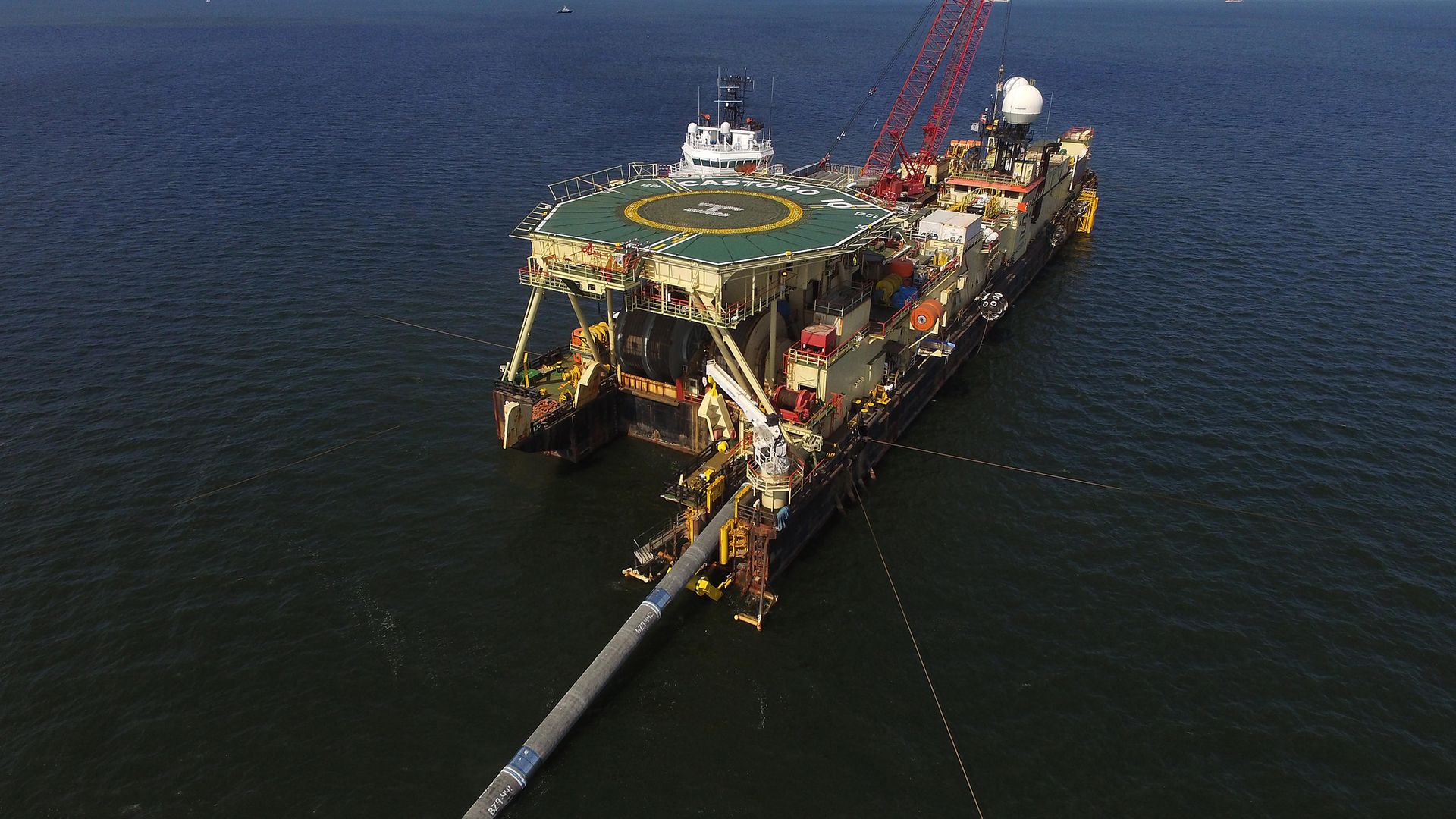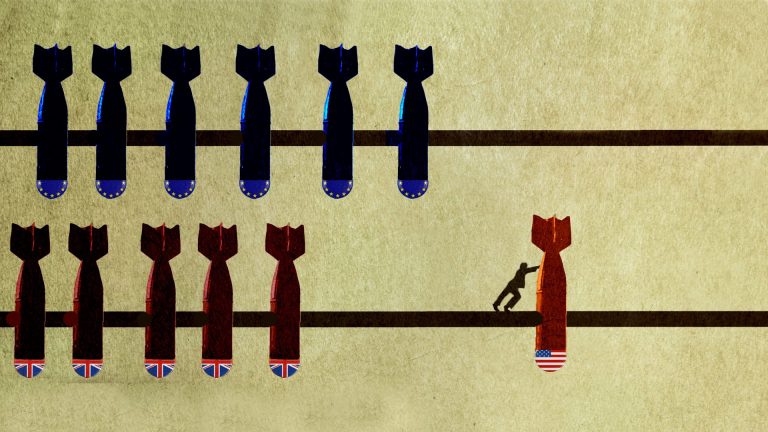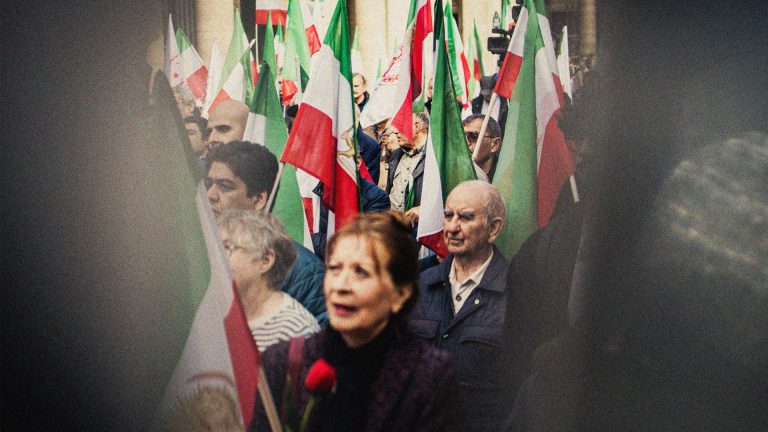From to the War of Jenkins’ Ear, in 1793, to the Cuban Missile Crisis, international disputes have often been triggered by events on the high seas. One sparked by activities on the seabed seems rather more unusual.
Yet the cause of the stand-off that has not only split the EU, but embroiled the US and deepened already glacial relations with Russia, can be found deep in the icy waters of the Baltic.
There lies the 2,460-kilometre-long Nord Stream 2 pipeline. Or, at least, there lies most of it, because the project is not yet complete and as a result of the international furore it has ignited, it may never be.
The pipeline was designed to double the amount of natural gas that could be pumped from Russia’s vast gas fields to Germany and beyond, to meet Europe’s growing energy needs. A deal to bring the gas along the bottom of the Baltic Sea was first struck in 2005 and the original Nord Stream has been in operation along the same route for a decade now.
But ever since work began on its younger sibling, Nord Stream 2, the project has become increasingly enmeshed in geopolitics, to the point where it has become a major diplomatic crisis: the Germans desperately want it and seem to be willing to sacrifice a lot to get it; the French disapprove of it; the eastern Europeans fear it; the Americans hate it; and the Russians… well, what they think about it varies according to who you ask.
After all, depending where in the world you’re reading this, Nord Stream 2 has been described as everything from an instrument of Russian hybrid warfare, a “malign influence project”, a modern-day Molotov-Ribbentrop Pact, a dire betrayal of the EU and the transatlantic relationship; or a much-needed energy supply that will help the environment, a business opportunity and a diplomatic “bridge” that will build relations with the east.
So, putting all the headlines and name-calling aside for a moment, which one is it? And, perhaps just as importantly, whose fault is it that it has come to this?
The idea for Nord Stream 2, one of the biggest infrastructure projects in Europe today, originated in Russia. The country had been trying to diversify its export routes for its huge natural gas reserves since the early 2000s. Following the country’s annexation of Crimea in 2014, those attempts have only accelerated, since existing pipelines pass through Ukraine.
A 2017 report for the German Institute for International and Security Affairs spelled out what the motivation for Moscow was: “Since 2014 Russia has made it abundantly clear that it is seeking alternative export routes, in order to avoid or minimise gas transport through Ukraine, which it now regards as an unacceptable risk for the Russians, this is the main reason to build Nord Stream 2.”
Bypassing the country via a northern route beneath the Baltic would deprive Ukraine of around three billion euros worth of transit fees a year. It could also be seen as another way for Russia to destabilise its neighbour.
Yet despite the state of relations between Moscow and Kiev, Russia still sends about 40% of its Europe-bound gas exports via Ukraine and signed a US$7 billion deal to keep doing so until 2024, an agreement that Berlin helped broker.
Germany’s interest in securing that supply from the east on that occasion – and allegedly at the heart of its support for Nord Stream 2 – is its own energy needs. The country is moving towards more sustainable energy, shutting down nuclear reactors earlier than planned – a move accelerated after Japan’s Fukushima nuclear disaster in 2011 – and phasing out coal-fired power plants. As a result, the Germans are the world’s biggest importers of natural gas, mostly from Russia. The idea behind Nord Stream 2 was that, in a worst case scenario, gas would keep German factories running.
And it is this prospect that has escalated the pipeline into such an international incident. In the early days of the scheme, the fears were about Russia using the construction process for installing underwater spy technology, or to justify increased military activity in the Baltic. Now, the fears are that the pipeline will give the Kremlin extraordinary leverage over Europe’s most powerful nation.
Donald Trump, whose dealings with Vladimir Putin were contradictory to say the least, was no fan of Nord Stream 2 and his White House tried to halt its progress by threatening sanctions on companies working on it. Joe Biden similarly considers the pipeline “a bad deal for Europe” and his administration has said it will be reviewing the restrictions imposed by his predecessor. So far, so simple. At a European level, though, things get more complicated. For while many of Washington’s concerns are shared in a number of European capitals – and have been turbocharged by the recent treatment of Russian opposition leader Alexei Navalny – Germany is unbowed.
The reasons for this lie not just in the country’s energy needs but in its complex relations with Russia – which are far closer than is often understood – and in its attitude towards foreign policy.
From 1969 onwards, West Germany pursued its Ostpolitik, or ‘eastern policy’. The main tenet was bringing about change in the Soviet Union through trade and understanding. Many Germans believe it was their Ostpolitik that brought about the end of the Cold War, and it has shaped the relationship between Germany and Russia ever since.
Berlin has never been as antagonistic towards Moscow as some other European capitals, and has built a transactional relationship, based, among other things, on trade. And it is through this prism that it now views the controversy over Nord Stream 2. For instance, Angela Merkel can, on the one hand, criticise the jailing of Navalny and subsequent expulsion of European diplomats by Russia, while on the other hand setting aside the pipeline as a “commercial project”. In her view, the two things should be “decoupled”. Or, as economics minister Peter Altmaier put it: “Business relationships and business projects that have existed for decades are one thing, and serious human rights violations and our reactions to them are another.”
It is also only fair to point out that the Russian regime of ten years ago, when discussions over Nord Stream 2 started, was very different to the brutal one that has since revealed itself. Certainly the signs were there, but this was a period when Dmitry Medvedev was president, and before the annexation of Crimea, the downing of MH17, full involvement in the Syrian conflict and the Salisbury poisonings.
Against this background, the original agreement becomes more understandable. Sarah Pagung, a Russian affairs specialist at the German Council on Foreign Relations, says the initiative for the pipeline likely began as an economic project proposed by the Social Democratic party and German business. “In my opinion, they originally came up with the pipeline as an economic project, but then framed it as selective cooperation with Russia,” she explains. This has precedent: Germany’s gas-importing relationship with Russia goes right back to 1970, the Cold War and those attitudes toward the Soviet Union that focussed on strategic cooperation and ‘change through rapprochement’.
Despite these warm intentions, since the very beginning Nord Stream 2 has had the whiff of scandal, with the suspicion that Germany was nudged in this direction by Russia-friendly political enablers. Former chancellor Gerhard Schröder is a prime suspect. He signed the deal on the first Nord Stream pipeline in 2005, only a few days after he had been voted out of the job.
Schröder, a personal friend of Putin, whom he called a “flawless democrat”, has continued to lobby for Russian energy interests at home for years and gave a lot of Germans a nasty shock when, in 2017, he became chairman of the board of directors at Russia’s biggest oil company, Rosneft. Apparently he would receive a salary of 298,000 euros for the job.
Other German politicians have also lobbied for the pipeline. The latest example may well be the new Foundation for Climate and Environmental Protection, founded in the Mecklenburg-Vorpommern – the German state where Nord Stream 2 comes ashore – in January this year. It is a lovely name for a foundation, and the state authorities gave 200,000 euros to set it up. But then it turned out the Nord Stream consortium was adding another 20 million euros to the foundation’s budget and appointing its director. Outraged locals fear the organisation will be used to get around US sanctions by providing cover to pipeline contractors, and described the state’s leader, Manuela Schwesig, as “the new Gerhard Schröder”. Certainly, while the German government remains in support of the underwater scheme, not all Germans are so sanguine.
“[The government has] had so many opportunities to scrap it and they have bent over backwards not to,” Gustav Gressel, a senior policy fellow at the European Council on Foreign Relations who focuses on Russia and eastern European matters, told The New European. “It’s really puzzling and incomprehensible. Merkel is neither stupid nor corrupt,” he continues, “but even Germany has some banana-republic aspects and this is one of them.”
“I think there are many reasons [why the German government supports the pipeline] but not all of them are convincing,” Pagung, from the German Council on Foreign Relations, says. “It’s a puzzle of different organisations and arrangements.”
To really understand the discussions around Nord Stream 2, she says, German attitudes towards Russia must be acknowledged. “Whenever there is debate on Russia in Germany, you can expect it to be emotional, even irrational,” Pagung explains. “In talking about Russia, Germans are actually also discussing a lot of other topics, including the issue of German identity, and regarding how ‘western’ Germany is, on a philosophical level. There is quite a long history – the last 200 to 300 years – of Germany not really belonging to western, or eastern, Europe.”
Pagung believes this is also at least partially why, for the last four years, the Germans have refused to do the US government’s bidding and shut the project down, despite an ever-growing list of American sanctions that stopped construction last year and, this January, saw the pipeline’s insurer, Zurich, back out of the project. Finding a new insurer is something that will become crucial to Nord Stream 2’s potential to actually ever export gas. It was only in late January that a Russian underwater-pipe-laying ship, the Fortuna, began work off the coast of Denmark again, on the project’s last 150 or so kilometres.
Also important in understanding the issues around the pipeline is a grasp of German-American relations, at least as they were in the Trump era when Berlin was perhaps blinded by its dislike of the US president. “I would say that the German government fell into a trap with the Trump administration,” Pagung says. “The Trump administration was insanely unpopular in Germany and they just couldn’t give in to it.”
Whether Germany can make good that misstep now that Biden is in the White House remains to be seen. International observers point to fluctuating bilateral relations between Washington and Berlin, with a good rapport during the Obama years sandwiched by periods of tensions with George W Bush – over Iraq – and Trump – over most things.
Merkel herself has gradually shifted, from her opposition days, as a vocal supporter of the transatlantic relationship to one of strategic European autonomy – of which she sees Nord Stream 2 as one element. The problem for her, and for Germany, is that it is an issue that divides, not unites, Europe.
And what of the US position – shared by the UK – that the pipeline is detrimental to the situation in Ukraine and a mortal threat to Europe, allowing Putin to hold Germany, and even Europe, hostage? Is it really possible that Russian could impact the continent’s energy security by simply turning off the gas tap?
In theory, yes, says Ian Bond, director of foreign policy and a Russia expert at the Centre for European Reform. “But that goes in both directions. The question is whether the EU will freeze before the Russians run out of money,” he adds. After all, the Russian economy – around the same size as Spain’s – is highly dependent on selling gas and oil to Europe.
Even if the Russians did turn off the tap, it might be difficult for them to hold anybody hostage for long. In 2018, a study by the German Institute for Economic Research, or DIW, concluded that Nord Stream 2 wasn’t as necessary for Europe as it had been made out to be. Forecasts about rising European demand for natural gas and the pipeline’s potential profitability were based on “outdated” and “controversial” methodology and assumptions, the German economists wrote.
The researchers also concluded that Europe’s gas supplies were secure and diversified enough that “even a complete supply interruption from Russia could be offset in both Germany and Europe by alternative supply sources and greater efficiency”.
In January this year, the DIW’s energy expert Claudia Kemfert doubled down on that. “From the beginning this project was a mistake,” she told German journalists, arguing that construction should be halted. “Better to have a horrible ending than horrors without end,” she quipped.
“The project is neither – as so often asserted – a danger to European energy security, nor is it essential,” researchers into energy policy at the German Institute for International and Security Affairs stated recently.
All of that not only negates the need for a second gas pipeline – the DIW also reported that Nord Stream 2 would most likely only run at 60% capacity – they dovetail with one analyst’s description of Nord Stream 2 as a “MacGuffin”. The term, coined by director Alfred Hitchcock, refers to a plot device in a movie that impacts the storyline but is, in itself, actually not significant.
“Nord Stream 2 is the energy MacGuffin,” Anna Bulakh, a former research fellow at the Centre for Defence Studies in Ukraine, wrote in 2019. “What Nord Stream 2 is not is a project to deliver additional gas supplies to the EU. The project has one principal object, and one principal object alone: division.”
“Dividing Ukraine from the EU, dividing the EU, dividing Germany from the rest of the EU and dividing the EU from the United States,” she argued, reflecting why Ukrainians and EU member states to the east continue to be so upset about German insistence on the pipeline.
This, then, is the view of those who – not without plenty of justification – mistrust the man in the Kremlin and see his malign hand in every move Russia makes. But are they right on this occasion?
Gressel, the analyst at the European Council on Foreign Relations, suspects that the whole process has been more like a series of unfortunate events and missteps – featuring German inflexibility, potentially unsavoury links between business and politics, a hostile US administration and increasingly visible Russian aggression, among other things – rather than a brilliant conspiracy hatched many years ago.
Infrastructure projects are always political and, as German researchers have also argued, “we purchase oil and gas from authoritarian regimes every day”, and most likely will need to keep doing so.
But one thing is certain now. No matter how Nord Stream 2 started off, nobody can deny any longer that it has become intensely political, perhaps even more political than anything else – even if the Germans government might still want to insist this is still all about business.
“The Germans would be well advised to find a way out of this,” Gressel concludes. “The political costs and loss of political capital is starting to far outweigh the economic benefits.”
What do you think? Have your say on this and more by emailing letters@theneweuropean.co.uk









